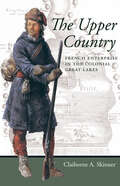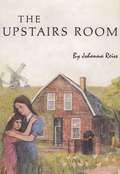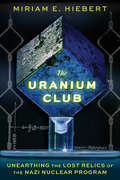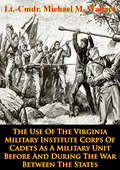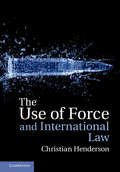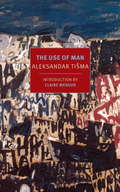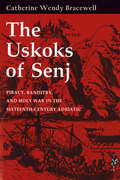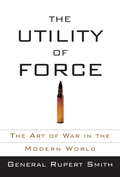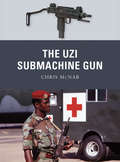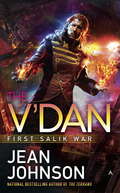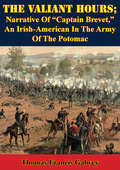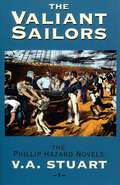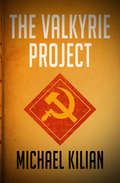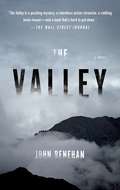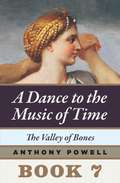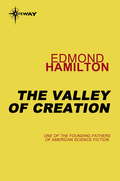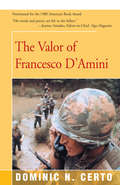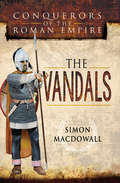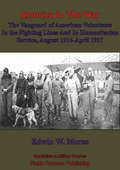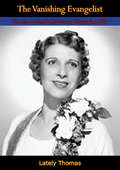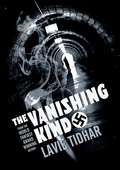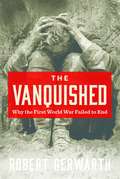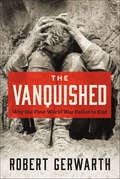- Table View
- List View
The Upper Country: French Enterprise in the Colonial Great Lakes (Regional Perspectives on Early America)
by Claiborne A. SkinnerThe Upper Country melds myth and conventional history to provide a memorable tale of French designs in the middle of what became the United States. Putting the reader on the battlefields, at the trading posts, and on the rivers with voyageurs and their allies from the Indian nations, Claiborne Skinner reveals the saintly missionaries and jolly fur traders of popular myth as agents of a hard-nosed, often ruthless, imperial endeavor. Skinner’s engaging narrative takes the reader through daily life at posts like Forts Saint Louis and Michilimakinac, illuminates the complexities of interracial marriage with the courtship of Michel Aco at Peoria, and explains how France's New World adventurism played a role in the outbreak of the Seven Years War and the beginning of the modern era.In this story, many of the traditional heroes and villains of American history take on surprising roles. The last Stuart kings of England seem shrewd and even human; George Washington makes his debut appearance on the stage of history by assassinating a French officer and plunging Europe into the first truly global war. From unthinkable hardship to dreams of fur trade profits, this fascinating exploration sheds new light on France and its imperial venture into the Great Lakes.
The Upstairs Room
by Johanna ReissA Life in Hiding<P><P> When the German army occupied Holland, Annie de Leeuw was eight years old. Because she was Jewish, the occupation put her in grave danger-she knew that to stay alive she would have to hide. Fortunately, a Gentile family, the Oostervelds, offered to help. For two years they hid Annie and her sister, Sini, in the cramped upstairs room of their farmhouse.<P> Most people thought the war wouldn't last long. But for Annie and Sini -- separated from their family and confined to one tiny room -- the war seemed to go on forever. <P> In the part of the marketplace where flowers had been sold twice a week-tulips in the spring, roses in the summer-stood German tanks and German soldiers. Annie de Leeuw was eight years old in 1940 when the Germans attacked Holland and marched into the town of Winterswijk where she lived. Annie was ten when, because she was Jewish and in great danger of being captured by the invaders, she and her sister Sini had to leave their father, mother, and older sister Rachel to go into hiding in the upstairs room of a remote farmhouse.<P> Johanna de Leeuw Reiss has written a remarkably fresh and moving account of her own experiences as a young girl during World War II. Like many adults she was innocent of the German plans for Jews, and she might have gone to a labor camp as scores of families did. "It won't be for long and the Germans have told us we'll be treated well," those families said. "What can happen?" They did not know, and they could not imagine.... But millions of Jews found out.<P> Mrs. Reiss's picture of the Oosterveld family with whom she lived, and of Annie and Sini, reflects a deep spirit of optimism, a faith in the ingenuity, backbone, and even humor with which ordinary human beings meet extraordinary challenges. In the steady, matter-of-fact, day-by-day courage they all showed lies a profound strength that transcends the horrors of the long and frightening war. Here is a memorable book, one that will be read and reread for years to come.<P> Newbery Medal Honor book<P><P> Jane Addams Children’s Book Honor Book
The Uranium Club: Unearthing the Lost Relics of the Nazi Nuclear Program
by Miriam E Hiebert Timothy W Koeth"Much as Marcel Proust spun out a lifetime of memories from the taste of a madeleine, The Uranium Club spins out the history of Nazi Germany's failed World War II atomic-bomb project by tracing the whereabouts of a small, blackened cube of Nazi uranium. It's a riveting tale of competing German ambitions and arrogant mistakes, a nonfiction thriller tracking teams of American scientists as they race to prevent Hitler from beating the United States to the atomic bomb." —Richard Rhodes, author of The Making of the Atomic BombTim Koeth peered into the crumpled brown paper lunch bag; inside was a surprisingly heavy black metal cube. He recognized the mysterious object instantly—he had one just like it sitting on his desk at home. It was uranium metal, taken from the nuclear reactor that Nazi scientists had tried—and failed—to build at the end of World War II. This unexpected gift, wrapped in a piece of paper inscribed with a few cryptic but crucial lines, would launch Koeth, a nuclear physicist and professor, and his colleague Miriam Hiebert, a cultural heritage scientist, on an odyssey to trace the tale of these cubes—two of the original 664 on which the Third Reich had pinned their nuclear ambitions. Part treasure hunt, part historical narrative, The Uranium Club winds its way through the back doors of World War II and Manhattan Project histories to recount the contributions of the men and women at the forefront of the race for nuclear power. From Werner Heisenberg and Germany's nuclear program to the Curies, the first family of nuclear physics, to the Allied Alsos Mission's infiltration of Germany to capture Nazi science to the renegade geologists of Murray Hill scouring the globe for uranium, the cubes are lodestars that illuminate a little-known—and hugely consequential—chapter of history.The cubes are physical testimony to the stories of the German failure, and the successful American program that launched the world into the modern nuclear age, and the lessons for modern science that the contrast in these two programs has to offer.
The Use Of The Virginia Military Institute Corps Of Cadets As A Military Unit: Before And During The War Between The States
by Lt.-Cmdr. Michael M. WallaceDuring the Civil War, the Confederate government passed legislation creating a national military academy and establishing the rank of Cadet. The national military college was unnecessary because the Confederacy already possessed numerous state military colleges However, the Confederate government failed to properly engage these individual state schools by providing curriculum recommendations or commissioning their graduates. This shortsighted and domineering attitude by the Confederate government ensured that the military colleges failed in their mission to produce a large number of officers for the Confederate army.It was the state governments (especially Virginia and South Carolina), not the Confederacy, that realized the importance that military colleges in the Confederacy and kept them operating with very little Confederate support. Virginia made a conscious decision to keep VMI open, not as a short term "officer candidate school," but with her four-year military and academic curriculum intact. Supporting the school both militarily and financially, VMI produced the most officers of the southern military colleges for service in the Confederate army. Additionally, the cadets themselves were used as a military unit by the Confederate and state governments numerous times in the war.
The Use of Force and International Law: The Impact Of The United States Upon The Jus Ad Bellum In The Post-cold War Era (The\ashgate International Law Ser.)
by Christian HendersonThe Use of Force and International Law offers an authoritative overview of international law governing the resort to force. Looking through the prism of the contemporary challenges that this area of international law faces, including technology, sovereignty, actors, compliance and enforcement, this book addresses key aspects of international law in this area: the general breadth and scope of the prohibition of force, what is meant by 'force', the use of force through the UN and regional organisations, the use of force in peacekeeping operations, the right of self-defence and the customary limitations upon this right, forcible intervention in civil conflicts, the controversial doctrine of humanitarian intervention. <P><P>Suitable for advanced undergraduate and postgraduate students, academics and practitioners, The Use of Force and International Law offers a contemporary, comprehensive and accessible treatment of the subject. Follows a clear and accessible structure to better support lecturers teach their courses and aid student understanding.<P> Clearly lays out the distinction between concepts and terms to enable students to grasp the fundamental distinctions before delving deeper into the subject.<P> Comprehensive references to primary and secondary sources support student understanding of the breadth of legal resources in the field and aid further research.
The Use of Man
by Claire Messud Aleksandar Tisma Bernard JohnsonThe Use of Man starts with an unexpected discovery. World War II is ending. Sredoje Lazukić has been fighting all through it. Now, as one of the victorious Partisans, he has come home to Novi Sad. He visits the house he grew up in. Strangers nervously show him around. He looks up the mother of Milinko, his best friend. Milinko's girlfriend, Vera, was the daughter of a Jew, a bookish businessman. Her house stands empty and open. Venturing in, Sredoje is surprised to find the diary of the German tutor that Milinko, Vera, and he all shared, Fräulein, who died on the operating table just before the war. Here, however, in a cheap notebook in Vera's old room, is a record of Fräulein's lonely days, with the sentimental caption Poésie. . . .The diary survived. Sredoje survived. Vera and Milinko have survived too. But what survives? A few years back Sredoje, Vera, and Milinko were teenagers, struggling to make sense of life. Life, they now know, can be more bitter than death. A work of stark poetry and illimitable sadness, The Use of Man is one of the great books of the 20th century.
The Uses and Limits of Small-Scale Military Interventions
by Molly Dunigan Caroline Baxter Stephen Watts Christopher RizziThe authors assess the utility and limitations of "minimalist stabilization"--small-scale interventions designed to stabilize a partner government engaged in violent conflict--and propose policy recommendations concerning when minimalist stabilization missions may be appropriate andthe strategies most likely to make such interventions successful, as well as the implications for U. S. Army force structure debates and partnership strategies.
The Uskoks of Senj: Piracy, Banditry, and Holy War in the Sixteenth-Century Adriatic
by Catherine Wendy BracewellIn this highly original and influential book, Catherine Wendy Bracewell reconstructs and analyzes the tumultuous history of the uskoks of Senj, the martial bands nominally under the control of the Habsburg Military Frontier in Croatia, who between the 1530s and the 1620s developed a community based on raiding the Ottoman hinterland, Venetian possessions in Dalmatia, and shipping on the Adriatic. Drawing on a broad range of sources, including the archives of the Dalmatian communes under Venetian rule and military frontier records, Bracewell provides the first comprehensive analysis of the uskoks as a social phenomenon, examining their origins, their military and social organization, their plunder economy, their mental world, and their relations with other groups in this borderland between three empires. The uskoks lived on the Christian-Muslim frontier, and they invoked Europe's struggle against Islam to justify their often bloody deeds. As Bracewell demonstrates, however, their actions were also shaped by the maze of local political and economic rivalries, social conflicts, and confessional antagonisms. In a book that tests the concept of the social bandit, the author analyzes the motives that guided the uskoks and distinguishes these from the factors that impelled various elements of the local population to support them.
The Utility of Force
by Rupert SmithFrom a highly decorated general, a brilliant new way of understanding war and its role in the twenty-first century.Drawing on his vast experience as a commander during the first Gulf War, and in Bosnia, Kosovo, and Northern Ireland, General Rupert Smith gives us a probing analysis of modern war. He demonstrates why today's conflicts must be understood as intertwined political and military events, and makes clear why the current model of total war has failed in Iraq, Afghanistan, and other recent campaigns. Smith offers a compelling contemporary vision for how to secure our world and the consequences of ignoring the new, shifting face of war.From the Trade Paperback edition.
The Uzi Submachine Gun
by Chris Mcnab Johnny ShumateThe Uzi submachine gun is one of the most recognizable weapons in history. Its familiarity stems in part from the sheer diversity of its users. Uzis have been seen gripped and fired by US secret service agents and SWAT teams, Israeli soldiers, European special forces, as well as criminals and terrorists the world over. The reasons they use the Uzi are simple - it provides devastating close-range firepower in a reliable, highly compact weapon.The Uzi Submachine Gun tells the story of this unique weapon. It not only explores the gun's technical development and specifications, and its history, but also describes the Uzi's combat use in a wide range of contexts, from Israeli soldiers battling on the Golan Heights in 1967, through to modern pirates operating off the coast of Somalia. The Uzi also thrives in various commercial markets, being a high-selling semi-auto design in the United States, for example. With a name given popular currency by the likes of Arnold Schwarzenegger and The Simpsons, the term 'Uzi' is instantly recognizable. The full extent of its capabilities, however, are not thoroughly understood, and this book presents the facts and challenges the myths of this remarkable weapon.From the Trade Paperback edition.
The V'Dan
by Jean JohnsonA thrilling new perspective of the world created in the explosive, national bestselling Theirs Not to Reason Why series. It's two hundred years earlier--the age of the First Salik War. And the battle against humanity has been engaged. The V'Dan always believed they were the chosen race, destined to make a mark on the galaxy. For the last few centuries, they interacted peacefully with other sentient species--save for the Salik. Cold, amphibious, and vicious, the Salik were set on one goal: to conquer every race within their grasp.Now that the Salik's ruthless war has begun, the fate of the galaxy is in the hands of two strange companions: Li'eth, a prince under siege and his rescuer, Jacaranda MacKenzie. A beautiful ambassador from the Motherworld, Jackie possesses more than the holy powers of a goddess. She brings a secret weapon--a strange, wondrous, and dangerous new technology that could be her and Li'eth's last and only hope to save their people from extinction...From the Paperback edition.
The Vacant Chair: The Northern Soldier Leaves Home
by Reid MitchellIn many ways, the Northern soldier in the Civil War fought as if he had never left home. On campsites and battlefields, the Union volunteer adapted to military life with attitudes shaped by networks of family relationships, in units of men from the same hometown. Understanding these links between the homes the troops left behind and the war they had to fight, writes Reid Mitchell, offers critical insight into how they thought, fought, and persevered through four bloody years of combat. In The Vacant Chair, Mitchell draws on the letters, diaries, and memoirs of common soldiers to show how mid-nineteenth- century ideas and images of the home and family shaped the union soldier’s approach to everything from military discipline to battlefield bravery. For hundreds of thousands of “boys,” as they called themselves, the Union army was an extension of their home and childhood experiences. Many experienced the war as a coming-of-age rite, a test of such manly virtues as self- control, endurance, and courage. They served in companies recruited from the same communities, and they wrote letters reporting on each other’s performance — conscious that their own behavior in the army would affect their reputations back home. So, too, were they deeply affected by letters from their families, as wives and mothers complained of suffering or demanded greater valor. Mitchell also shows how this hometown basis for volunteer units eroded respect for military rank, as men served with officers they saw as equals: “Lieut. Col Dewey introduced Hugh T. Reid," one sergeant wrote dryly, by saying, ‘Boys, behold your colonel,’ and we beheld him.” In return, officers usually adopted paternalist attitudes toward their “boys” — especially in the case of white officers commanding black soldiers. Mitchell goes on to look at the role of women in the soldiers’ experiences, from the feminine center of their own households to their hatred of Confederate women as “she-devils." The intimate relations and inner life of the Union soldier, the author writes, tell us much about how and why he kept fighting through four bloody years — and why demoralization struck the Confederate soldier as the war penetrated the South, threatening his home and family while he was at the front. “The Northern soldier did not simply experience the war as a bus- band, son, father, or brother —he fought that way as well,” he writes. “That was part of his strength. The Confederate soldier fought the war the same way, and, in the end, that proved part of his weakness.” The Vacant Chair uncovers this critical chapter in the Civil War experience, showing how the Union soldier saw — and won — our most-costly conflict.
The Valiant Hours; Narrative Of “Captain Brevet,” An Irish-American In The Army Of The Potomac
by Thomas Francis Galwey"Thomas Francis De Burgh Galwey was born in London, England, in 1846, of an Irish family, one of the oldest branches of the Burkes of Galway. The family came to this country in 1851 and settled on a farm just outside of Cleveland, the site now being on Euclid Avenue. When the Civil War broke out, Galwey enlisted in the Hibernian Guard Company of the 8th Ohio Volunteer Infantry. He was a slim, beardless youth only 5 feet 4 inches tall, but with a restless, lively spirit which soon won him promotion to corporal, sergeant, and lieutenant. His dark hair and snapping black eyes, as well as his effervescent and courageous spirit proclaimed his Gaelic ancestry, of which he was intensely proud.During the war Galwey meticulously made daily entries in his diary, a series of small leather-covered notebooks which he carried in his knapsack. From time to time he transcribed these notes into a larger book. Both of these journals have been preserved, and constitute the bulk of this narrative. The editor has simply changed the diary form to that of a narrative, adding a few notes here and there to clarify the background. Galwey's original sketch-maps have been reproduced, and a few others of the same type added. In transcribing his notes to the larger journal, Galwey frequently switched back and forth between the present and past tense. Some of this has been retained, to preserve the contemporary flavor and authenticity.The last chapter contains some additional biographical data contributed by Colonel Geoffrey Galwey, the author's son. It deals with Thomas Galwey's life after the war and sheds further light on the character and activities of a fascinating personality." - Foreword.
The Valiant Sailors
by V. A. StuartNovember 1853: Sailing beneath the ominous cloud of war between Turkey and Russia, the 300-horsepower, 31-gun steam frigate Trojan is on her way to the Crimea with a large Royal Navy Fleet to deal with the Russian Black Sea fleet and support the conquest of Sevastopol. The Trojan is carrying on board a mysterious passenger: a young woman whose identity must be concealed by orders of the Admiralty. Although First Lieutenant Phillip Hazard is captivated by the charming young woman, he has a far more pressing concern: the Trojan's captain is a sadistic despot—and quite possibly insane.With The Valiant Sailors, Stuart introduces her 8-volume series, which presents an exciting and authentic picture of naval operations during the Crimean War.
The Valkyrie Project
by Michael KilianA doomed journalist travels to Iceland to destroy a Soviet superweapon Halfway between the United States and the Soviet Union, Iceland is one of the most strategic points in the Cold War. And home to a NATO squadron that could wipe Moscow off the map in an instant, it&’s is about to become the unwitting host for the most daring operation in military history. On the remote coast of this frost-bound island, the Soviets are building a laser powerful enough to bring the United States to its knees. They call it Valkyrie, and once it&’s operational, the free world will no longer be free. When an exiled East German scientist notices a suspicious drain on the Icelandic electrical grid, the KGB sends an assassin to protect their superweapon. Halting the madness falls to Jack Spencer, an American journalist with a terminal disease—which may kill him before he gets a chance to save the world.
The Valley
by John Renehan*Named one of Wall Street Journal's Best Books of 2015*Selected as a Military Times's Best Book of the Year "You're going up the Valley." Black didn't know its name, but he knew it lay deeper and higher than any other place Americans had ventured. You had to travel through a network of interlinked valleys, past all the other remote American outposts, just to get to its mouth. Everything about the place was myth and rumor, but one fact was clear: There were many valleys in the mountains of Afghanistan, and most were hard places where people died hard deaths. But there was only one Valley. It was the farthest, and the hardest, and the worst. When Black, a deskbound admin officer, is sent up the Valley to investigate a warning shot fired by a near-forgotten platoon, he can only see it as the final bureaucratic insult in a short and unhappy Army career. What he doesn't know is that his investigation puts at risk the centuries-old arrangements that keep this violent land in fragile balance, and will launch a shattering personal odyssey of obsession and discovery as Black reckons with the platoon's dark secrets, accumulated over endless hours fighting and dying in defense of an indefensible piece of land. The Valley is a riveting tour de force that changes our understanding of the men who fight our wars and announces John Renehan as one of the great American storytellers of our time.From the Hardcover edition.
The Valley of Bones: A Dance Ot The Music Of Time (A Dance of Music and Time)
by Anthony PowellAnthony Powell’s universally acclaimed epic A Dance to the Music of Time offers a matchless panorama of twentieth-century London. Now, for the first time in decades, readers in the United States can read the books of Dance as they were originally published—as twelve individual novels—but with a twenty-first-century twist: they’re available only as e-books. World War II has finally broken out, and The Valley of Bones (1964) finds Nick Jenkins learning the military arts. A stint at a training academy in Wales introduces him to the many unusual characters the army has thrown together, from the ambitious bank clerk-turned-martinet, Gwatkin, to the hopelessly slovenly yet endearing washout, Bithel. Even during wartime, however, domestic life proceeds, as a pregnant Isobel nears her term and her siblings’ romantic lives take unexpected turns—their affairs of the heart lent additional urgency by the ever-darkening shadow of war. "Anthony Powell is the best living English novelist by far. His admirers are addicts, let us face it, held in thrall by a magician."--ChicagoTribune "A book which creates a world and explores it in depth, which ponders changing relationships and values, which creates brilliantly living and diverse characters and then watches them grow and change in their milieu. . . . Powell's world is as large and as complex as Proust's."--Elizabeth Janeway, New YorkTimes "One of the most important works of fiction since the Second World War. . . . The novel looked, as it began, something like a comedy of manners; then, for a while, like a tragedy of manners; now like a vastly entertaining, deeply melancholy, yet somehow courageous statement about human experience."--Naomi Bliven, New Yorker “The most brilliant and penetrating novelist we have.”--Kingsley Amis
The Valley of Creation
by Edmond HamiltonIn that hidden valley, land of strangely forbidding beauty, Eric Nelson, soldier of fortune, faced a battle weirder and more savage than any he had ever fought. He was hired to fight for humanity, against beings that seemed to be both more and less than human.The weapons of the enemy included centuries-old powers of magic and superstition . . . but Nelson fought grimly, even when his mind was helplessly trapped in the body of a wolf. Then came the climactic test of his allegiance, the knowledge that more than just humanity was at stake . . . and the final mind-shattering discovery of an alien secret that lay buried in the Cavern of Creation!
The Valor of Francesco D'Amini
by Dominic N CertoMen lived and grew old and died in a few weeks in Vietnam. A lot of them didn't live that long. This is the story of one young soldier's coming of age in hell. What he saw, how he felt, the way he reacted when friends were blasted to bits right in front of him. This is a story of a few men, but it will stand for all of them. War brought out the best and worst in men, the killers and the guys who just wanted to get home. They were there and they fought a merciless enemy, killing to stay alive. This is a brutal, shocking, nightmarish book--one that you will never forget.
The Vandals: The Vandals (Conquerors of the Roman Empire)
by Simon MacDowallAn up-close look at the Germanic people who sacked Rome in the fifth century AD. On 31 December AD 406, a group of German tribes crossed the Rhine, pierced the Roman defensive lines, and began a rampage across Roman Gaul, sacking cities such as Metz, Arras, and Strasbourg. Foremost amongst them were the Vandals, and their search for a new homeland took them on the most remarkable odyssey. The Romans were unable to stop them and their closest allies, the Alans, marching the breadth of Gaul, crossing the Pyrenees, and making themselves masters of Spain. However, this kingdom of the Vandals and Alans soon came under intense pressure from Rome&’s Visigothic allies. In 429, under their new king, Gaiseric, they crossed the straits of Gibraltar to North Africa. They quickly overran this rich Roman province and established a stable kingdom. Taking to the seas, they soon dominated the Western Mediterranean and raided Italy, famously sacking Rome itself in 455. Eventually, however, they were utterly conquered by Belisarius in 533 and vanished from history. Simon MacDowall narrates and analyzes these events, with particular focus on the evolution of Vandal armies and warfare.
The Vanguard Of American Volunteers In The Fighting Lines And In Humanitarian Service: August,1914-April, 1917 [Illustrated Edition]
by Edwin MorseIllustrated with 6 portraitsEven before the official entry of the United States of America into the First World War in April 1917, many of its citizens had already crossed over "The Pond" and already had lent their efforts to the Allied cause. The author Edwin Morse set himself a terribly difficult task to record even a handful of these gallant soldiers, doctors, surgeons and aviators; he selected as a sampling of 34 different stories which he set out to tell in brief. Those he selected contributed to the Allied cause in different and diverse ways - some joined the Foreign Legion, some the British Army, others supported the medical services or drove ambulances; still further more joined the French Army aviators and formed the famous Lafayette Escadrille.
The Vanishing Evangelist: The Aimee Semple McPherson Kidnapping Affair
by Lately ThomasDuring the afternoon of May 18, 1926, and auburn-haired woman whose name was virtually an American household word went for a swim in the Pacific. She was not seen to come out of the water. Thousands of Californians who had thronged to hear the dynamic Aimee Semple McPherson preach at her floodlit Angelos Temple were stunned at the news of her disappearance. Two people died in the attempt to find her body. Services were held for her at the Temple and a memorial fund was collected.Meanwhile, however, letters had begun to come in, demanding $500,000 ransom for the return of Sister Aimee. And five weeks after the vanished, Aimee turned up in a Mexican border town with a circumstantial story of having been kidnapped and then imprisoned in a desert shack, and of having escaped on foot across miles of sandy wastes.The missing shepherd was welcomed back to life with great rejoicing by the Temple flock. But certain skeptics—among them the Los Angeles district attorney—had doubts about her story. Why was no shack to be found that would fit her description? Why was she neither sunburned nor thirsty when she returned? And who was the mysterious “Miss X,” so remarkably like the evangelist, who had occupied, with a “Mr. McIntyre,” a rented honeymoon cottage at Carmel-by-the-Sea while Aimee was gone?These questions led to a grand-jury investigation with sensational surprised of its own, and eventually brought the evangelist and certain others into court, where the disclosures made were as startling—and as hilarious—as anything that had preceded…“The whole story is one of the funniest episodes from the harebrained 1920s….It has been told in great and amusing detail….”—GILBERT HIGHET“It’s more fun than a barrel of—well, Holy Rollers.”—LESLIE HANSCOM, New York Telegram and Sun“It is a story far too fantastic for fiction; nobody would believe it if it appeared between the covers of a novel…”—FREDERIC BABCOCK, Chicago Tribune
The Vanishing Kind
by Lavie TidharLONGLISTED FOR THE HUGO AWARD FOR BEST NOVELLA“Perhaps the best novella of the year” –Locus“Pretty close to perfect –SFcrowsnestYEAR’S BEST SF SELECTION (GARDNER DOZOIS)YEAR’S BEST SF&F SELECTION (RICH HORTON)YEAR’S TOP SHORT SF NOVELS SELECTION (ALLEN KASTER)“London after the war wasn’t a place you went to on holiday…”Gunther Sloam comes to Nazi-occupied London in search of an old flame. But when she turns up dead, Gunther is accused of the crime...Moving through the dark streets of London, pursued by the enigmatic Everly of the British Gestapo, Gunther is in way over his head. London after the Nazi occupation is a place haunted by shadows, and everyone he meets is lying to him. As Gunther gets drawn into a deadly web of conspiracy, illicit drug dealing, prostitution and blackmail, the only question is: can he stay alive long enough to find answers?An new alternate history noir masterpiece from the multiple award winning author of A Man Lies Dreaming and Unholy Land!
The Vanquished: Why the First World War Failed to End
by Robert GerwarthAn epic, groundbreaking account of the ethnic and state violence that followed the end of World War I―conflicts that would shape the course of the twentieth century For the Western Allies, November 11, 1918, has always been a solemn date―the end of fighting that had destroyed a generation, but also a vindication of a terrible sacrifice with the total collapse of the principal enemies: the German Empire, Austria-Hungary, and the Ottoman Empire. But for much of the rest of Europe this was a day with no meaning, as a continuing, nightmarish series of conflicts engulfed country after country. In The Vanquished, a highly original and gripping work of history, Robert Gerwarth asks us to think again about the true legacy of the First World War. In large part it was not the fighting on the Western Front that proved so ruinous to Europe’s future, but the devastating aftermath, as countries on both sides of the original conflict were savaged by revolutions, pogroms, mass expulsions, and further major military clashes. In the years immediately after the armistice, millions would die across central, eastern, and southeastern Europe before the Soviet Union and a series of rickety and exhausted small new states would come into being. It was here, in the ruins of Europe, that extreme ideologies such as fascism would take shape and ultimately emerge triumphant. As absorbing in its drama as it is unsettling in its analysis, The Vanquished is destined to transform our understanding of not just the First World War but the twentieth century as a whole.
The Vanquished: Why the First World War Failed to End
by Robert GerwarthAn epic, groundbreaking account of the ethnic and state violence that followed the end of World War I and shaped the course of the twentieth century.Winner of the Tomlinson Book PrizeA Times Literary Supplement Best Book of 2016In The Vanquished, a highly original and gripping work of history, Robert Gerwarth asks us to think again about the true legacy of the First World War. In large part it was not the fighting on the Western Front that proved so ruinous to Europe’s future, but the devastating aftermath, as countries on both sides of the original conflict were savaged by revolutions, pogroms, mass expulsions, and further major military clashes. In the years immediately after the armistice, millions would die across central, eastern, and southeastern Europe before the Soviet Union and a series of rickety and exhausted small new states would come into being. It was here, in the ruins of Europe, that extreme ideologies such as fascism would take shape and ultimately emerge triumphant.As absorbing in its drama as it is unsettling in its analysis, The Vanquished is destined to transform our understanding of not just the First World War but the twentieth century as a whole.
